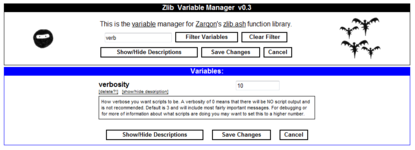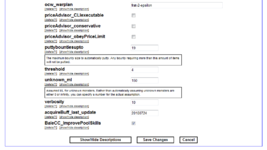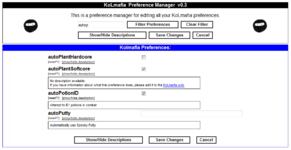That FN Ninja
Member
Zlib Variable Manager v0.3
KoLmafia Preference Manager v0.3
A variable manager for Zarqon's zlib.ash function library.


A property manager for all your KoLmafia properties.

These require Jason Harper's htmlform.ash
Remember: htmlform.ash goes in your scripts directory and relay_zlib_manager.ash & relay_pref_manager.ash go in your relay folder like the names suggest.
Cross Compatibility Concerns Conquered! Cool.
Browsers tested: IE, Firefox, Opera, and Chrome approved. I think it's interesting to note that these run significantly slower in Firefox.
Thanks to:
Zarqon for zlib and all the other resources he's contributed to the KoLmafia scripting community.
Jason Harper for htmlform.ash
Heeheehee for his original zlib variable editor which was used as a starting point for these.
Change log:
07.11.10 - Removed sections and implemented a filter button instead
07.12.10 - Fixed Browser cross-compatibility issues.
02.25.11 - PrefMan v0.3 update. Added version tracking. Now parses the descriptions of the variables from the KoLmafia wiki.
02.26.11 - PrefMan: added workaround for customCombatScript property. Thanks Theraze.
KoLmafia Preference Manager v0.3
A variable manager for Zarqon's zlib.ash function library.


A property manager for all your KoLmafia properties.

These require Jason Harper's htmlform.ash
Remember: htmlform.ash goes in your scripts directory and relay_zlib_manager.ash & relay_pref_manager.ash go in your relay folder like the names suggest.
Cross Compatibility Concerns Conquered! Cool.
Browsers tested: IE, Firefox, Opera, and Chrome approved. I think it's interesting to note that these run significantly slower in Firefox.
Thanks to:
Zarqon for zlib and all the other resources he's contributed to the KoLmafia scripting community.
Jason Harper for htmlform.ash
Heeheehee for his original zlib variable editor which was used as a starting point for these.
Change log:
07.11.10 - Removed sections and implemented a filter button instead
07.12.10 - Fixed Browser cross-compatibility issues.
02.25.11 - PrefMan v0.3 update. Added version tracking. Now parses the descriptions of the variables from the KoLmafia wiki.
02.26.11 - PrefMan: added workaround for customCombatScript property. Thanks Theraze.
Attachments
Last edited:
